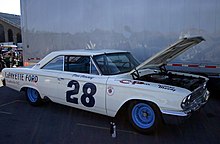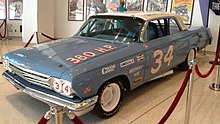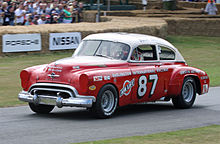Generation 1 (NASCAR)
 Hudson Hornet at the NASCAR Hall of Fame in Charlotte, North Carolina | |
| Constructor | |
|---|---|
| Successor | Generation 2 |
| Technical specifications | |
| Engine | 90° pushrod V-8 Inline-six (Hudson Hornet only) 303–440 cu in (5.0–7.2 L) |
| Competition history | |
| Debut | February 15, 1948 (Daytona Beach Road Course, Florida)[1] |
| Last event | October 30, 1966 (1966 American 500) |
The Generation 1 in NASCAR refers to the inaugural generation of post-war cars used between 1948 and 1966. The first generation of stock cars used a strictly-stock body and frame, the doors were strapped with the use of seat belts being required, and a heavy-duty rear axle was mandated to stop the cars from rolling over during a race.[2] These cars were almost identical to their road-going counterparts, albeit with tuning and modifications to the car itself being prohibited. It was also notable for being the only generation of stock cars to use real doors.[3] Examples include the Hudson Hornet, Oldsmobile Rocket 88, Ford Galaxie, Plymouth Belvedere, Pontiac Catalina, and the Chevrolet Impala.
They were eventually replaced by the Generation 2 cars in 1967.[4][5]
Models[edit]
Chrysler Corporation[edit]


- Hudson Hornet: 1950-1954
- Plymouth Belvedere: 1959
Ford Motor Company[edit]

- Ford Galaxie: 1958-1965
- Ford Thunderbird: 1959-1964
General Motors[edit]




- Chevrolet Impala: 1955-1962
- Oldsmobile Rocket 88: 1949-1953
- Pontiac Catalina: 1950-1958
Studebaker[edit]

- Studebaker Starlight: 1949-1952
